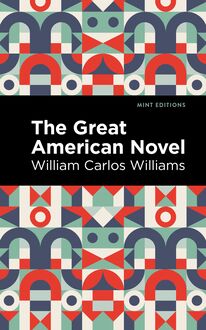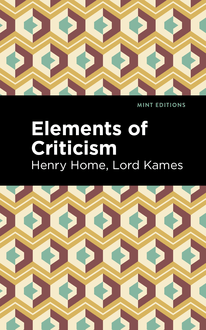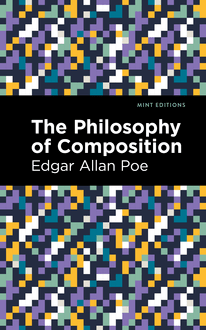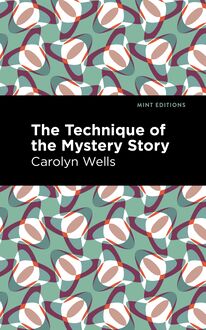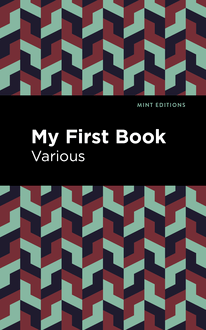-
 Univers
Univers
-
 Ebooks
Ebooks
-
 Livres audio
Livres audio
-
 Presse
Presse
-
 Podcasts
Podcasts
-
 BD
BD
-
 Documents
Documents
-
- Cours
- Révisions
- Ressources pédagogiques
- Sciences de l’éducation
- Manuels scolaires
- Langues
- Travaux de classe
- Annales de BEP
- Etudes supérieures
- Maternelle et primaire
- Fiches de lecture
- Orientation scolaire
- Méthodologie
- Corrigés de devoir
- Annales d’examens et concours
- Annales du bac
- Annales du brevet
- Rapports de stage
La lecture à portée de main
Vous pourrez modifier la taille du texte de cet ouvrage
Découvre YouScribe en t'inscrivant gratuitement
Je m'inscrisDécouvre YouScribe en t'inscrivant gratuitement
Je m'inscrisEn savoir plus
Vous pourrez modifier la taille du texte de cet ouvrage
En savoir plus

Description
The Great American Novel (1923) is an experimental novel by William Carlos Williams. Although he is predominately known as a poet, Williams frequently pushed the limits of prose style throughout his career. In the defining decade of Modernism, Williams sought to try his hand at the so-called “Great American Novel,” a concept fueling impassioned debate in academic and artistic circles nationwide. Far from conventional, Williams’ novel is a metafictional foray into matters more postmodern than modern, a commentary masquerading as narrative and a satire of the all-American overreliance on cliché in form and content. “If there is progress then there is a novel. Without progress there is nothing. Everything exists from the beginning. I existed in the beginning. I was a slobbering infant. Today I saw nameless grasses—I tapped the earth with my knuckle. It sounded hollow. It was dry as rubber. Eons of drought. No rain for fifteen days. No rain. It has never rained. It will never rain.” Williams’ novel begins with the word and a birth. Language describes the experience of awakening to experience, of coming into consciousness as a living being in a living world. Using words from everyday speech, he builds a novel out of observations, a book that remains conscious of itself throughout. Like the child whose first experience with the written word often comes from names and slogans stretched over trucks and billboards, the reader eventually comes to accept their new reality, a world where people love and succeed and fail, where history and art intercede to make meaning where they can. The Great American Novel showcases Williams’ experimental form, stretching the meaning of “novel” to its outermost limit. With a beautifully designed cover and professionally typeset manuscript, this edition of William Carlos Williams’ The Great American Novel is a classic of American literature reimagined for modern readers.
Sujets
Informations
| Publié par | Mint Editions |
| Date de parution | 28 mai 2021 |
| Nombre de lectures | 1 |
| EAN13 | 9781513288031 |
| Langue | English |
Informations légales : prix de location à la page 0,0300€. Cette information est donnée uniquement à titre indicatif conformément à la législation en vigueur.
Extrait
The Great American Novel
William Carlos Williams
The Great American Novel was first published in 1923.
This edition published by Mint Editions 2021.
ISBN 9781513283012 | E-ISBN 9781513288031
Published by Mint Editions ®
minteditionbooks .com
Publishing Director: Jennifer Newens
Design & Production: Rachel Lopez Metzger
Project Manager: Micaela Clark
Typesetting: Westchester Publishing Services
C ONTENTS I . T HE F OG II III IV V VI VII VIII IX X XI XII XIII XIV XV XVI XVII XVIII XIX
I
T HE F OG
I f there is progress then there is a novel. Without progress there is nothing. Everything exists from the beginning. I existed in the beginning. I was a slobbering infant. Today I saw nameless grasses—I tapped the earth with my knuckle. It sounded hollow. It was dry as rubber. Eons of drought. No rain for fifteen days. No rain. It has never rained. It will never rain. Heat and no wind all day long better say hot September. The year has progressed. Up one street down another. It is still September. Down one street, up another. Still September. Yesterday was the twenty second. Today is the twenty first. Impossible. Not if it was last year. But then it wouldn’t be yesterday. A year is not as yesterday in his eyes. Besides last year it rained in the early part of the month. That makes a difference. It rained on the white goldenrod. Today being misplaced as against last year makes it seem better to have white—Such is progress. Yet if there is to be a novel one must begin somewhere.
Words are not permanent unless the graphite be scraped up and put in a tube or the ink lifted. Words progress into the ground. One must begin with words if one is to write. But what then of smell? What then of the hair on the trees or the golden brown cherries under the black cliffs. What of the weakness of smiles that leave dimples as much as to say: forgive me—I am slipping, slipping, slipping into nothing at all. Now I am not what I was when the word was forming to say what I am. I sit so on my bicycle and look at you greyly, dimpling because it is September and I am older than I was. I have nothing to say this minute. I shall never have anything to do unless there is progress, unless you write a novel. But if you take me in your arms—why the bicycle will fall and it will not be what it is now to smile greyly and a dimple is so deep—you might fall in and never, never remember to write a word to say good-bye to your cherries. For it is September. Begin with September.
To progress from word to word is to suck a nipple. Imagine saying: My dear, I am thirsty, will you let me have a little milk—This to love at first sight. But who do you think I am, says white goldenrod? Of course there is progress. Of course there are words. But I am thirsty, one might add. Yes but I love you and besides I have no milk. Oh yes, that is right. I forgot that we were speaking of words. Yet you cannot deny that to have a novel one must have milk. Not at the beginning. Granted, but at the end at least. Yes, yes, at the end. Progress from the mere form to the substance. Yes, yes, in other words: milk. Milk is the answer.
But how have milk out of white goldenrod? Why, that was what the Indians said. The bosom of the earth sprays up a girl balancing, balancing on a bicycle. Rapidly she passes through the first—the second eight years. Progress, you note. But September was rainy last year and how can it ever be dry again unless one go back to the year before that. There are no words. It cannot be any otherwise than as this is built the bosom of the earth shrinks back; phosphates. Yet to have a novel—Oh catch up a dozen good smelly names and find some reason for murder, it will do. But can you not see, can you not taste, can you not smell, can you not hear, can you not touch—words? It is words that must progress. Words, white goldenrod, it is words you are made out of—T HAT is why you want what you haven’t got.
Progress is to get. But how can words get.—Let them get drunk. Bah. Words are words. Fog of words. The car runs through it. The words take up the smell of the car. Petrol. Face powder, arm pits, food-grease in the hair, foul breath, clean musk. Words. Words cannot progress. There cannot be a novel. Break the words. Words are indivisible crystals. One cannot break them—Awu tsst grang splith gra pragh og bm—Yes, one can break them. One can make words. Progress? If I make a word I make myself into a word. Such is progress. I shall make myself into a word. One big word. One big union. Such is progress. It is a novel. I begin small and make myself into a big splurging word: I take life and make it into one big blurb. I begin at my childhood. I begin at the beginning and make one big—Bah.
What difference is it whether I make the words or take the words. It makes no difference whatever.
There cannot be a novel. There can only be pyramids, pyramids of words, tombs. Their warm breasts heave up and down calling for a head to progress toward them, to fly onward, upon a word that was a pumpkin, now a fairy chariot, and all the time the thing was rolling backward to the time when one believed. Hans Anderson didn’t believe. He had to pretend to believe. It is a conspiracy against childhood. It runs backward. Words are the reverse motion. Words are the flesh of yesterday. Words roll, spin, flare up, rumble, trickle, foam—Slowly they lose momentum. Slowly they cease to stir. At last they break up into their letters—Out of them jumps the worm that was—His hairy feet tremble upon them.
Leaving the meeting room where the Mosquito Extermination Commission had been holding an important fall conference they walked out on to the portico of the County Court House Annex where for a moment they remained in the shadow cast by the moon. A fog had arisen in which the egg-shaped white moon was fixed—so it seemed. They walked around the side of the old-fashioned wooden building—constructed in the style of the fine residences of sixty years ago and coming to the car he said: Go around that side as I will have to get in here by the wheel. The seat was wet with dew and cold—after the exceptionally hot day. They sat on it nevertheless. The wind-shield was opaque with the water in minute droplets on it—through which the moon shone with its inadequate light. That is, our eyes being used to the sun the moon’s light is inadequate for us to see by. But certain bats and owls find it even too strong, preferring the starlight. The stars also were out.
Turning into the exit of the parking space he stopped the car and began to wipe the wind-shield with his hand. Take this rag said the other, with one hand already in his trowser pocket. So the glass was wiped on both sides, the top and the bottom pane and the cloth—which looked a good deal like a handkerchief—was returned to the owner—who put it back where it came from not seeming to mind that it was wet and dirty. But of course the man is a mechanic in a certain sense and doesn’t care.
On the highway they began to encounter the fog. It seemed in the rush of the car to come and meet them. It came suddenly, with a rush and in a moment nothing could be seen but the white billows of water crossed in front by the flares of the headlights. And so it went all the way home, sometimes clearer, sometimes so thick he had to stop, nearly—ending in his own bed-room with his wife’s head on the pillow in the perfectly clear electric light. The light shone brightest on the corner of her right eye, which was nearest it, also on the prominences of her face.
Her right arm was under her head. She had been reading. The magazine Vanity Fair, which he had bought thinking of her, lay open on the coverlet. He looked at her and she at him. He smiled and she, from long practice, began to read him, progressing rapidly until she said: You can’t fool me.
He became very angry but understood at once that she had penetrated his mystery, that she saw he was stealing in order to write words. She smiled again knowingly. He became furious.
II
I ’m new, said she, I don’t think you’ll find my card here. You’re new; how interesting. Can you read the letters on that chart? Open your mouth. Breathe. Do you have headaches? No. Ah, yes, you are new. I’m new, said the oval moon at the bottom of the mist funnel, brightening and paling. I don’t think you’ll find my card there. Open your mouth—Breathe—A crater big enough to hold the land from New York to Philadelphia. New! I’m new, said the quartz crystal on the parlor table—like glass—Mr. Tiffany bought a cart load of them. Like water or white rock candy—I’m new, said the mist rising from the duck pond, rising, curling, turning under the moon—Unknown grasses asleep in the level mists, pieces of the fog. Last night it was an ocean. Tonight trees. Already it is yesterday. Turned into the wrong street seeking to pass the power house from which the hum, hmmmmmmmmmmmmm—sprang. Electricity has been discovered for ever. I’m new, says the great dynamo. I am progress. I make a word. Listen! U MMMMMMMMMMMM —
Ummmmmmmmmm—Turned into the wrong street at three A.M. lost in the fog, listening, searching—Waaaa! said the baby. I’m new. A boy! A what? Boy. Shit, said the father of two other sons. Listen here. This is no place to talk that way. What a word to use. I’m new, said the sudden word.
The fog lay in deep masses on the roads at three A.M. Into the wrong street turned the car seeking the high pitched singing tone of the dynamos endlessly spinning in the high banquet hall, filling the house and the room where the bed of pain stood with progress. Ow, ow! Oh help me somebody! said she. U MMMMMM sang the dynamo in the next street, U MMMM . With a terrible scream she drowned out its sound. He went to the window to see if his car was still there, pulled the curtain aside, green—Yes it was still there under the light where it would not be so likely to be struck by other cars coming in the fog. There it was as still as if
-
 Univers
Univers
-
 Ebooks
Ebooks
-
 Livres audio
Livres audio
-
 Presse
Presse
-
 Podcasts
Podcasts
-
 BD
BD
-
 Documents
Documents
-
Jeunesse
-
Littérature
-
Ressources professionnelles
-
Santé et bien-être
-
Savoirs
-
Education
-
Loisirs et hobbies
-
Art, musique et cinéma
-
Actualité et débat de société
-
Jeunesse
-
Littérature
-
Ressources professionnelles
-
Santé et bien-être
-
Savoirs
-
Education
-
Loisirs et hobbies
-
Art, musique et cinéma
-
Actualité et débat de société
-
Actualités
-
Lifestyle
-
Presse jeunesse
-
Presse professionnelle
-
Pratique
-
Presse sportive
-
Presse internationale
-
Culture & Médias
-
Action et Aventures
-
Science-fiction et Fantasy
-
Société
-
Jeunesse
-
Littérature
-
Ressources professionnelles
-
Santé et bien-être
-
Savoirs
-
Education
-
Loisirs et hobbies
-
Art, musique et cinéma
-
Actualité et débat de société
- Cours
- Révisions
- Ressources pédagogiques
- Sciences de l’éducation
- Manuels scolaires
- Langues
- Travaux de classe
- Annales de BEP
- Etudes supérieures
- Maternelle et primaire
- Fiches de lecture
- Orientation scolaire
- Méthodologie
- Corrigés de devoir
- Annales d’examens et concours
- Annales du bac
- Annales du brevet
- Rapports de stage
